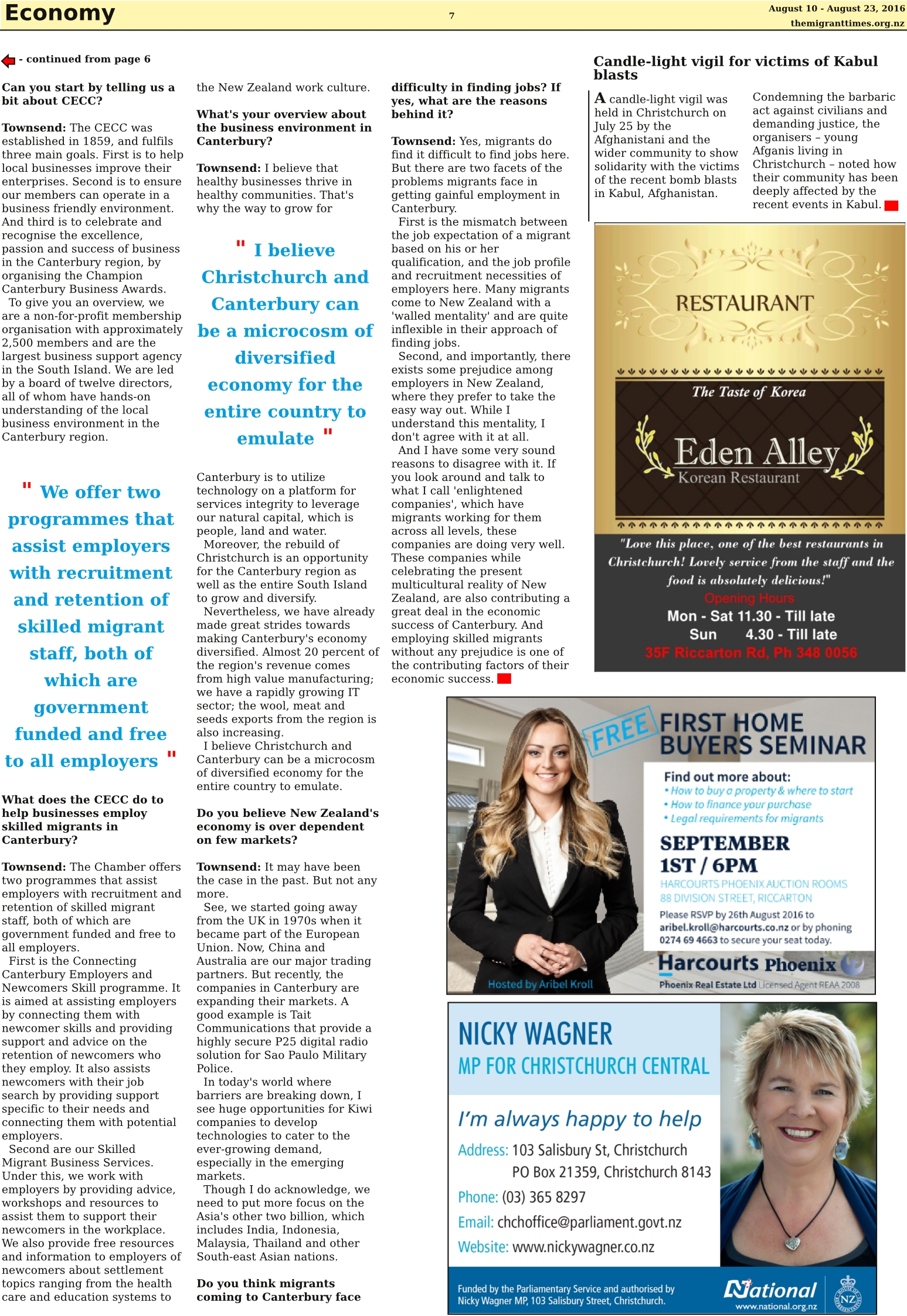'Enlightened companies' in Canterbury celebrate diversity by employing migrants: Peter Townsend
(from The Migrant Times; the original story is here https://themigranttimes.org.nz/stories/2016/8/11/enlightened-companies-in-canterbury-celebrate-diversity-by-employing-migrants-peter-townsend?rq=peter)
- and they are highly successful in their businesses as a result
Peter Townsend is the Chief Executive of the Canterbury Employers' Chamber of Commerce (CECC), a position he has held since 1996. In addition, he holds several corporate directorships and is the Honorary Consul for Chile for the South Island. In recognition of his services to businesses and communities, he received the Companion of the New Zealand Order of Merit (CNZM) in the 2014 New Year’s Honours. He is actively engaged in earthquake recovery issues and as such he was appointed to the Canterbury Earthquake Recovery Advisory Board on Transition in January 2015. He is also on the Board of Pegasus Health and Ōtākaro Limited - a new Crown company established to deliver key anchor projects and precincts in Christchurch.
This newspaper caught up with Townsend recently for his comments on the prevailing economic situation in Canterbury and the issues migrants face in getting gainful employment in the South Island.
Can you start by telling us a bit about CECC?

Townsend: The CECC was established in 1859, and fulfils three main goals. First is to help local businesses improve their enterprises. Second is to ensure our members can operate in a business friendly environment. And third is to celebrate and recognise the excellence, passion and success of business in the Canterbury region, by organising the Champion Canterbury Business Awards.
To give you an overview, we are a non-for-profit membership organisation with approximately 2,500 members and are the largest business support agency in the South Island. We are led by a board of twelve directors, all of whom have hands-on understanding of the local business environment in the Canterbury region.
What does the CECC do to help businesses employ skilled migrants in Canterbury?
Townsend: The Chamber offers two programmes that assist employers with recruitment and retention of skilled migrant staff, both of which are government funded and free to all employers.
First is the Connecting Canterbury Employers and Newcomers Skill programme. It is aimed at assisting employers by connecting them with newcomer skills and providing support and advice on the retention of newcomers who they employ. It also assists newcomers with their job search by providing support specific to their needs and connecting them with potential employers.
Second are our Skilled Migrant Business Services. Under this, we work with employers by providing advice, workshops and resources to assist them to support their newcomers in the workplace. We also provide free resources and information to employers of newcomers about settlement topics ranging from the health care and education systems to the New Zealand work culture.
What's your overview about the business environment in Canterbury?
Townsend: I believe that healthy businesses thrive in healthy communities. That's why the way to grow for Canterbury is to utilize technology on a platform for services integrity to leverage our natural capital, which is people, land and water.
Moreover, the rebuild of Christchurch is an opportunity for the Canterbury region as well as the entire South Island to grow and diversify.
Nevertheless, we have already made great strides towards making Canterbury's economy diversified. Almost 20 percent of the region's revenue comes from high value manufacturing; we have a rapidly growing IT sector; the wool, meat and seeds exports from the region is also increasing.
I believe Christchurch and Canterbury can be a microcosm of diversified economy for the entire country to emulate.
Do you believe New Zealand's economy is over dependent on few markets?
Townsend: It may have been the case in the past. But not any more.
See, we started going away from the UK in 1970s when it became part of the European Union. Now, China and Australia are our major trading partners. But recently, the companies in Canterbury are expanding their markets. A good example is Tait Communications that provide a highly secure P25 digital radio solution for Sao Paulo Military Police.
In today's world where barriers are breaking down, I see huge opportunities for Kiwi companies to develop technologies to cater to the ever-growing demand, especially in the emerging markets.
Though I do acknowledge, we need to put more focus on the Asia's other two billion, which includes India, Indonesia, Malaysia, Thailand and other South-east Asian nations.
Do you think migrants coming to Canterbury face difficulty in finding jobs? If yes, what are the reasons behind it?
Townsend: Yes, migrants do find it difficult to find jobs here. But there are two facets of the problems migrants face in getting gainful employment in Canterbury.
First is the mismatch between the job expectation of a migrant based on his or her qualification, and the job profile and recruitment necessities of employers here. Many migrants come to New Zealand with a 'walled mentality' and are quite inflexible in their approach of finding jobs.
Second, and importantly, there exists some prejudice among employers in New Zealand, where they prefer to take the easy way out. While I understand this mentality, I don't agree with it at all.
And I have some very sound reasons to disagree with it. If you look around and talk to what I call 'enlightened companies', which have migrants working for them across all levels, these companies are doing very well. These companies while celebrating the present multicultural reality of New Zealand, are also contributing a great deal in the economic success of Canterbury. And employing skilled migrants without any prejudice is one of the contributing factors of their economic success.


Click on the images to enlarge and read the printed version of the interview.
